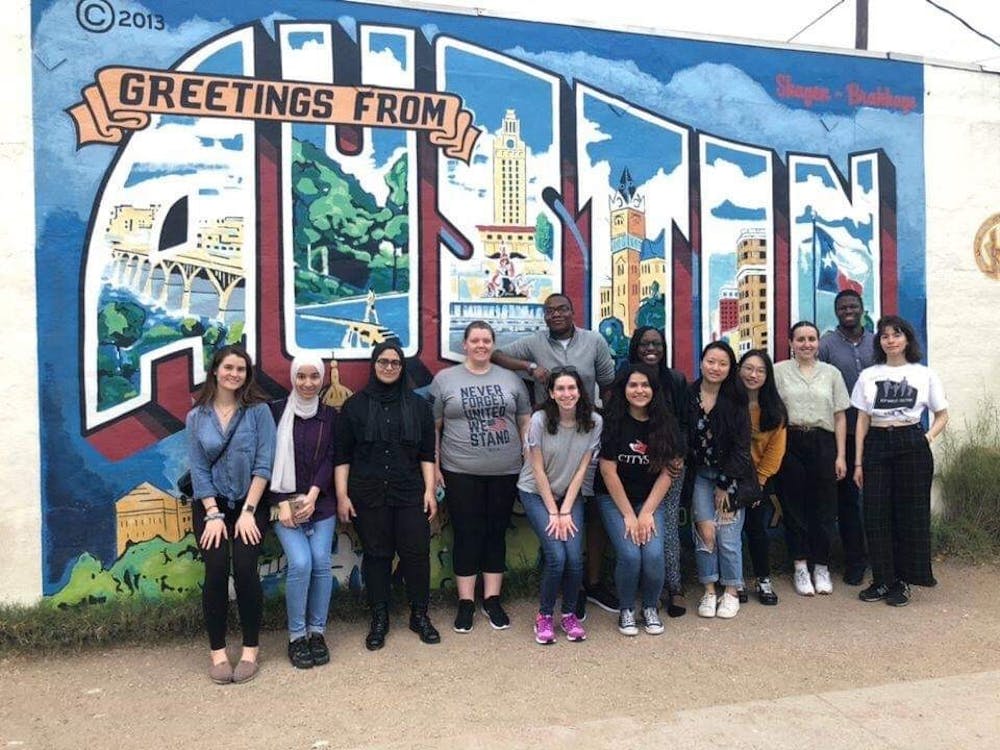As the post–spring–break slump winds down, and school starts back in earnest, some of us may find our thoughts drifting to spring break next year. While it's always fun to use this time to relax on a beach or at home, Penn Alternative Breaks—a student–run organization that collaborates with various community partners to provide Penn students with service and engagement trips during school breaks—offers a unique, meaningful way to spend spring break. Here’s how the students who went on PAB’s three spring break trips spent their time this year.

Courtesy of Natasa Rohacs
New York, NY
East New York Farms is an organization that has worked with youth, gardeners, farmers, and entrepreneurs since 1998 to address food justice in the local community, through promoting sustainable agriculture and community–led economic development. The students on this PAB trip worked every day at different community gardens and urban farms operated by the ENYF in the Brooklyn area. Their services ranged from shoveling snow and mulch, to building maintenance and gardening. The students also got to speak to the people who ran the farms and gardens, and learn more about not only the communities that they were serving, but also about urban farming and food production.
During the trip, the students lived in dorms of a local church. They visited the Brooklyn Botanic Garden, cooked together, and got to know each other through various bonding exercises and service reflections. “Overall, the best experience was that I got to really listen to all these people who I would not have met otherwise… and bond in a way that you normally don’t do with people you don’t know,” Natasa Rohacs (C ‘22), a first–time PAB participant, says. “It was really interesting to come from being complete strangers to knowing so much about each other in a week.”
In terms of the actual gardening, one experience that Natasa found memorable was shoveling mulch for a neighborhood garden. “It was fun. I enjoy manual labor… And it felt like we were actually contributing to something.”

Austin, Texas
The Workers Defense Project is membership–based, non–profit organization that aims to improve the working and living conditions of low–wage workers through education, direct services, and community organization. Many of their members are recent immigrants, and Penn students got to help out with English Partners Night—an opportunity for WDP’s English as a Second Language students to practice English in a real–world context. Penn students also helped the organization prepare for an upcoming lobby night, sat in on a weekly meeting where members discuss issues such as the wage gap and working conditions, and did other day–to–day organization work. “It was cool knowing that, because there was a group of 13 of us, we were saving them a lot of time by getting all of those things done at once,” Rachel Kulik (W ‘21), one of the two site leaders for this trip, says.
During the trip, the students lived in a church on the campus of the University of Texas at Austin. When they had free time from their work, they would explore Austin, visiting the Blanton Museum of Art, the Texas State Capitol building while it was in session, and an old fashioned honky–tonk. They also reflected on their service work every night, and discussed its various social and personal implications.
The most meaningful experience for Rachel, as well as for many others on the trip, was the English Partners Night. Students got to work first–hand with the people who they had been helping in their volunteer work. “It was incredible to get a sense of how hopeful the members of this organization are,” Rachel says, “that they can take the power to improve their work situations, and fight for a better life for themselves and their families.”
Some of WDP’S ESL students wanted to learn English to connect with their children, while others wanted better work opportunities. “One guy was like, ‘I like going to music festivals, and a lot of people want to talk and make friends at these things, and I feel like I don’t know enough English to do that,’” Rachel says. “It was really cool to see that people were motivated to improve their English for different reasons.”

Guyan Valley, WV
Per its mission statement, the Appalachia Service Project is “a Christian ministry, open to all people, that inspires hope and service through volunteer home repair and replacement in Central Appalachia.” Since 1969, the organization has brought volunteers from around the country to help low–income families make their homes warmer, safer, and drier.
During this trip, Penn students lived at the Guyan Valley branch of the ASP Service Center in West Virginia, along with student groups from three other colleges. During the day, Penn students worked on caulking a house. According to one of the two site leaders, Aileen Walsh (C ‘20), even though many students had little experience with construction, they were able to pick up the job—after some ASP training—with no problem. At night, the ASP staff ran educational activities about the area to explore issues such as rural poverty. These programs included a poverty simulation, a presentation by a local historian, and a look into how ASP processes the applications for receiving service. “It gave us a lot of context for the organization we were working for as well as the place we were working in,” Aileen says.
For Aileen, as well as some others on the trip, it was incredibly meaningful to spend time with the family for whom they worked, as both ASP and PAB stress how important it is for volunteers to establish a relationship with people whom they helped. “We had a lot of great conversations, and shared some meals together,” Aileen says. “That was by far the best experience.”
Aileen concludes by giving a passionate endorsement of the PAB's mission as a whole: "It's one of the best decisions that I've made at Penn."







